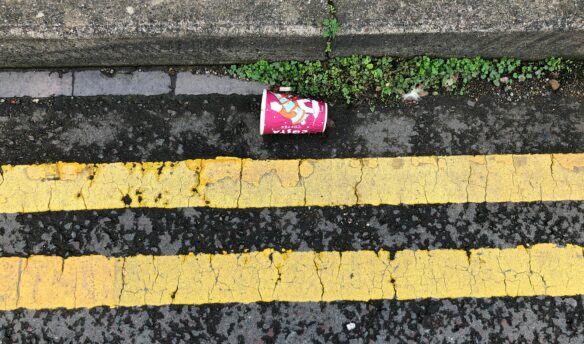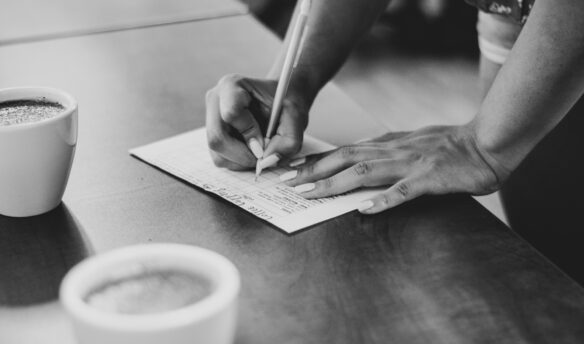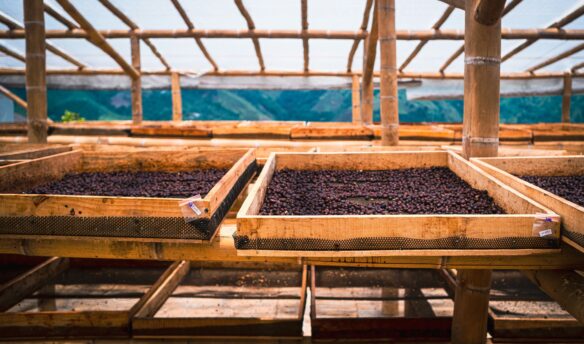Starbucks locations in Korea are asking customers to please leave the printer at home. Plus, a new report bucks myths about “clean” coffee, researchers examine climate threats in China, and a community in Florida rallies around a coffee shop owner detained by ICE.
‘New Research Sheds Light on Arabica’s Biggest Threats’ – via Global Coffee Report
Climate change continues to put coffee at risk. One of the suggestions scientists have proposed is to move production to higher altitudes and to areas once thought unsuitable for cultivation. To learn more, scientists examined 30 years of data in Yunnan—a subtropical region in China further from the equator than many other coffee-growing areas—to illuminate the climate threats that coffee could face in new growing regions.
The study, published in NPJ Natural Hazards, found that “chill stress,” or frost, was coffee’s primary climate stressor in the Yunnan region, where most coffee in China is grown. Yunnan sits at the northern edge of the “coffee belt,” the area between the Tropics of Cancer and Capricorn that offers the best conditions for growing coffee.
Researchers found that, for every 1°C temperature drop below freezing during the cherry’s maturation phase, coffee yields fell by nearly 19%. After frost, drought was the second-biggest stressor, followed by heat.
The study authors note that previous research has pointed to heat as the main threat to coffee yields. They also mention that Yunnan’s northern location brings lower temperature drops than most major coffee regions, which means their findings may not apply elsewhere.
However, as coffee production moves uphill in the face of rising temperatures, the authors write, “understanding coffee yield response to climate stressors in marginal growing areas is crucial.” The researchers recommended three key strategies to counter the impacts of frost, drought, and heat: plant more shade trees, improve irrigation infrastructure, and issue warnings quickly for frost and low temperatures to allow farmers time to prepare.
Read the full story on coffee climate challenges here.
‘Customers Rally To Support a Popular Jacksonville Coffee Shop Owner in ICE Custody’ – via The Florida Times-Union
When a Jacksonville coffee shop owner was arrested, facing possible deportation by ICE, neighbors, customers, and a city councillor rallied to her side.
Diana Marcela Mejia, owner of Artessence Coffee Shop in Jacksonville, emigrated legally to the U.S. from Colombia with her family in 2021. She was in the process of obtaining permanent status, but was arrested after experiencing a mental health crisis on August 2. She was subsequently detained by the U.S. Immigration and Customs Enforcement.
As Teresa Stepzinski reports for the Florida Times-Union, Mejia’s family and attorney have been unable to contact her since.
Mejia’s stepdaughter, Sharis Jinete, told the Florida Times-Union that her stepmother had been suffering from panic attacks and hallucinations driven by fear of being abducted by ICE agents. “She had moments where she was feeling persecuted for being an immigrant,” Jinete said. According to a filing by the Department of Homeland Security, DHS had “determined that probable cause exists that the subject [Mejia] is a removable individual.”
Mejia opened Artessence in the Jacksonville neighborhood of Springfield in 2022 with her husband, Jonatan Jinete. The cafe has since developed a loyal customer base—about a hundred customers gathered to support Mejia’s family after hearing news of her detention.
Jacksonville city councillor Jimmy Peluso, who arranged for the show of support, told Stepzinski that what happened to Mejia is “truly despicable. “These are individuals that are doing the right things in our country and our city, and it shouldn’t matter where they come from or what their status is,” Peluso said.
ICE hasn’t stopped at coffee shops—the agency has also raided coffee farms in Hawaii. In May, we brought news of raids targeting farmworkers and their families on the island of Kona, an area that relies heavily on migrant laborers to pick coffee.
Many have already decided not to make the trip from the mainland for the harvest, which begins this month. “They told us they’re not going to come this year,” farmer Armando Rodriguez told the Honolulu Civil Beat about migrant workers. “I’m predicting we’re going to lose a lot of coffee because there’s a lot of coffee on the trees.”
Read more about the ICE incident here or via Yahoo! News here.
‘Leave Your Home Offices at Home: Starbucks Draws the Line at Desktops’ – via The Korea Herald
Starbucks customers in Korea may be a little too comfortable bringing their home office equipment into the cafe.
We have previously told you about Korea’s booming coffee scene, where the number of coffee shops has doubled in less than a decade. This has resulted in companies racing to cut prices, increased foreign investment, and an influx of international brands. Alongside this boom has come a rise in customers using cafes as places to spend hours studying or working.
As Moon Joon-hyun reports for The Korea Herald, the trend has inspired its own name: “cagongjok,” which blends the Korean for “cafe” and “study tribe.”
Although most customers bring in their laptops, some have taken it a step further, bringing desktop computers, printers, and power strips. This practice has become so common that Starbucks has put up notices inside its Korean locations asking customers to please “refrain from bringing desktop computers, printers, or other bulky items” into their stores, according to a spokesperson.
Some customers have been posting photos of the most egregious setups on social media, including people placing printers on chairs and even setting up three-sided desk partitions to turn a public table into their personal office.
Starbucks’ updated policies are “so all customers can have a pleasant and accessible store experience,” the spokesperson told Fortune.
The rise of “cagongjok” culture is divisive in Korea and has been an issue for coffee shop owners for several years. According to a 2019 estimate by the Korea Foodservice Industry Research Institute, a customer buying one coffee and hanging out becomes unprofitable for the cafe after one hour and 42 minutes.
Read the full story on customers bringing in printers here.
More News
‘Coffee Sold at Dollar General Recalled for ‘Potential Presence’ of Glass’ – via ABC News
‘Denver Broncos Take Legal Action Against Former Official Coffee Partner’ – via Daily Coffee News
‘This Florida Café Lets You Sip Coffee With Capybaras’ – via CBS News
‘Starbucks Cancels North Philly Community Store’ – via Axios Philadelphia
‘US Coffee Buyers Requesting To Postpone Brazil Imports, Brazilian Lobby Says’ – via Reuters
Is Coffee Good For You?
You may have come across blogs or social media posts over the past few years making claims that coffee is full of mold, mycotoxins, and other “contaminants.” Dozens of articles have come out refuting these claims, but of course, these brands say you should still buy their specially-tested coffee instead.
“Clean” coffee is part of the growing wellness industry, and now a consumer education nonprofit has looked into the subject. Clean Label Project (CLP) examined 57 samples from 45 coffee brands to look for traces of contaminants and toxins. The result? Pretty good, in most cases.
“While some contaminants were present, most were found at minimal levels and well below the European Union’s safety limits per 6-ounce serving,” Molly Hamilton, CLP’s executive director, told CNN. “This means coffee is generally safe.”
CLP’s report did find traces of the herbicide glyphosate in two samples and one of its byproducts, aminomethylphosphonic acid, in 41 out of 57. Glyphosate (the active ingredient in Roundup, an herbicide) has been classified as carcinogenic by the World Health Organization, but is still widely used in countries worldwide. However, the Environmental Protection Agency has said that, in small doses, the herbicide is safe to consume (its impact on the workers spraying it is another matter entirely).
In their report, CLP noted that “overall, caffeinated coffee is one of the cleanest categories the Clean Label Project has tested.” National Coffee Association CEO Bill Murray stressed this as well, telling CNN that “decades of independent scientific evidence show that coffee drinkers live longer, healthier lives.”
Beyond the Headlines
‘How Worker-Owned Coffee Shops Embrace Equal Pay and Ownership’ by Madison Lucchesi
‘No Migrants, No Coffee: The Struggling Nicaraguans Powering Costa Rica’s Harvest’ by Karla Perez
















